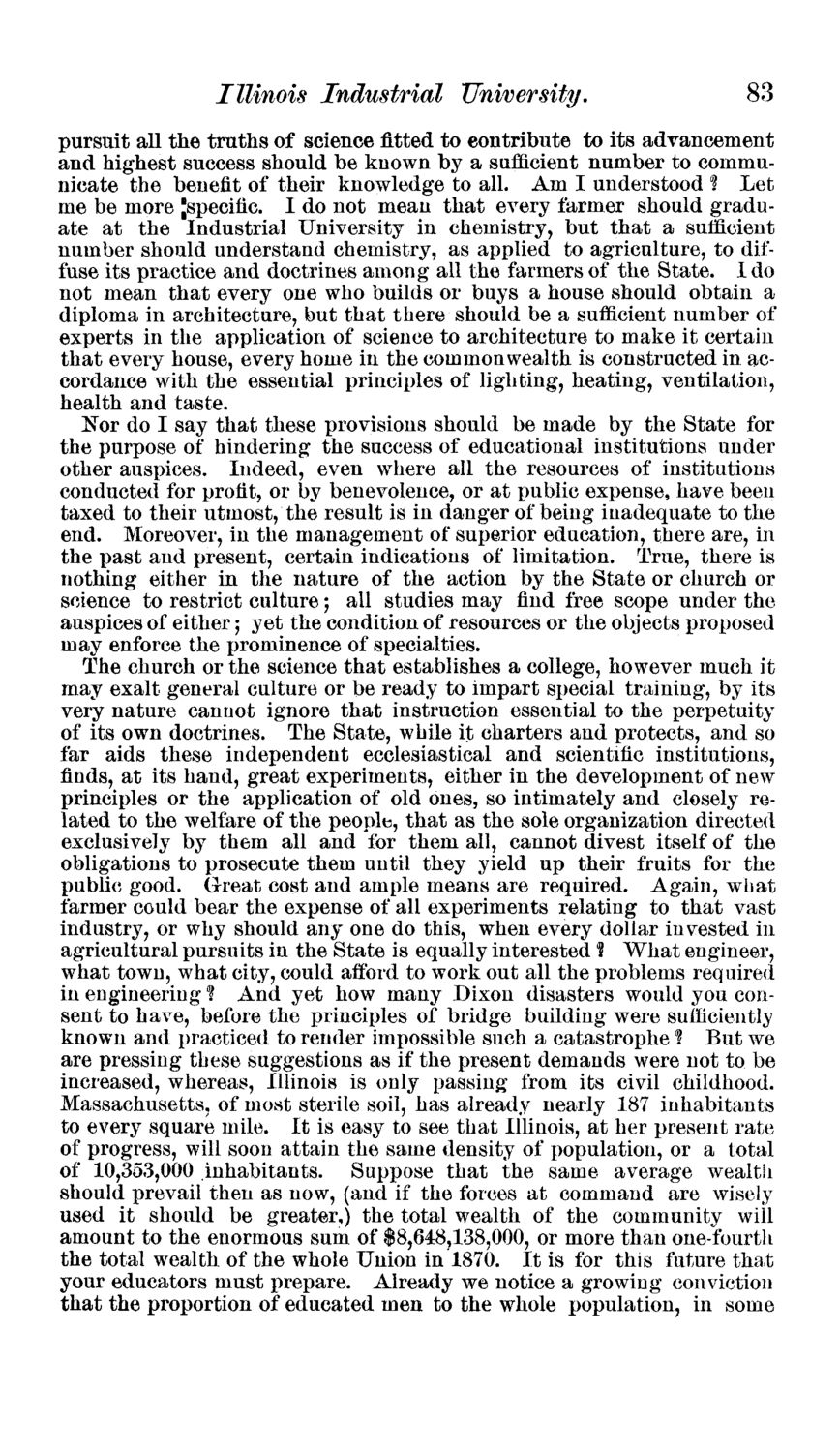| |
| |
Caption: Board of Trustees Minutes - 1874
This is a reduced-resolution page image for fast online browsing.

EXTRACTED TEXT FROM PAGE:
Illinois Industrial University. 83 pursuit all the truths of science fitted to contribute to its advancement and highest success should be known by a sufficient number to communicate the benefit of their knowledge to all. Am I understood % Let me be more [specific. I do not mean that every farmer should graduate at the Industrial University in chemistry, but that a sufficient number should understand chemistry, as applied to agriculture, to diffuse its practice and doctrines among all the farmers of the State. I do not mean that every one who builds or buys a house should obtain a diploma in architecture, but that there should be a sufficient number of experts in the application of science to architecture to make it certain that every house, every home in the commonwealth is constructed in accordance with the essential principles of lighting, heating, ventilation, health and taste. Kor do I say that these provisions should be made by the State for the purpose of hindering the success of educational institutions under other auspices. Indeed, even where all the resources of institutions conducted for profit, or by benevolence, or at public expense, have been taxed to their utmost, the result is in danger of being inadequate to the end. Moreover, in the management of superior education, there are, in the past and present, certain indications of limitation. True, there is nothing either in the nature of the action by the State or church or science to restrict culture; all studies may find free scope under the auspices of either ,• yet the condition of resources or the objects proposed may enforce the prominence of specialties. The church or the science that establishes a college, however much it may exalt general culture or be ready to impart special training, by its very nature cannot ignore that instruction essential to the perpetuity of its own doctrines. The State, while it charters and protects, and so far aids these independent ecclesiastical and scientific institutions, finds, at its hand, great experiments, either in the development of new principles or the application of old ones, so intimately and closely related to the welfare of the people, that as the sole organization directed exclusively by them all and for them all, cannot divest itself of the obligations to prosecute them until they yield up their fruits for the public good. Great cost and ample means are required. Again, what farmer could bear the expense of all experiments relating to that vast industry, or why should any one do this, when every dollar invested in agricultural pursuits in the State is equally interested % What engineer, what town, what city, could afford to work out all the problems required in engineering % And yet how many Dixon disasters would you consent to have, before the principles of bridge building were sufficiently known and practiced to render impossible such a catastrophe % But we are pressing these suggestions as if the present demands were not to be increased, whereas, Illinois is only passing from its civil childhood. Massachusetts, of most sterile soil, has already nearly 187 inhabitants to every square mile. It is easy to see that Illinois, at her present rate of progress, will soon attain the same density of population, or a total of 10,353,000 inhabitants. Suppose that the same average wealth should prevail then as now, (and if the forces at command are wisely used it should be greater,) the total wealth of the community will amount to the enormous sum of $8,648,138,000, or more than one-fourth the total wealth of the whole Union in 1870. It is for this future that your educators must prepare. Already we notice a growing conviction that the proportion of educated men to the whole population, in some
| |